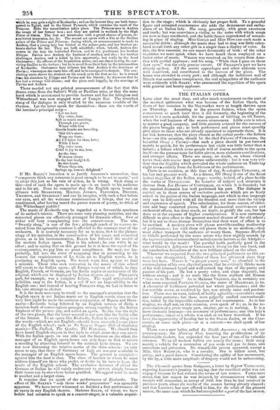THE ITALIAN OPERA
LONG after the usual time, and after much wonderment on the part of the musical quidnuncs what was become of the Italian Opera, the doors of her mansion in the Haymarket were at length thrown open on Thursday. According to the present fashion, when the opera commences so much later than it did formerly, the beginning of the season is a mere makeshift, for the purpose of rubbing on till Easter, when the real business of the season commences. Little care is taken to muster a good company, and little anxiety evinced for the success of the pieces brought out ; as both performers and pieces must speedily give place to those who are already appointed to supersede them. It is too bad, however, that the piece chosen as the enfant perdu—the forlorn hope—on this occasion, should be the chef d'teuvre of CIMAROSA, the beautiful Orazj e Curiazj—that such a piece should be put forward merely to perish, for its performance last night was little better than a failure ; a failure which some people will of course ascribe to the opera itself—to the present taste for fuller pieces, more elaborate combinations, and stronger effects. There are many, no doubt, on whose vitiated tastes these deficiencies may operate unfavourably: but it was very evi- dent that the frigidity which pervaded the whole audience on Thursday night arose entirely from the feebleness of the performance. There is no occasion, at this time of day, es eulogize CratAnosa, Or his last and greatest work. As a drama, Gil Orazj is one of the finest lyrical tragedies of the Italian stage; worthy, indeed, of a place beside the works of MErasastsro. Its beauties of subject and structure it derives from Les Boraces of CORNEILLE, on which it is founded ; but .the musical dramatist has well performed his part. The dialogue is carried on in those scenes of recitatioo parlante which are so finely suited to the genius of the Italian language, and which in that language only can be delivered with all the freedom and more than the variety and expression of speech. The substitution, for those scenes, of elabo- rate and busy concerted pieces, full of harmonieal contrivances and orchestral effects, has done much, no doubt, to gratify the ear, but has done so at the expense of higher considerations. It is now extremely difficult to give effect to the greatest musical dramas of the old school ; but it is not to those dramas themselves that their want of effect is to be ascribed. A modern piece will please notwithstanding mediocrity of performance ; but with those old pieces there is no medium—they must either transport the audience or weary them. Suppose Macbeth or Othello performed by the same actors who draw nightly crowds by the representation of accumulated melodramatic horrors at the Adelphi- what would be the result? The parallel holds perfectly good in the case of GLUCK'S Iphigenia or CIMA.ROSA.'S Orazj on the one hand, and the numberless favourites of the new brilliant school on the other.
Whatever we expected from the two principal performers on this oc- casion was disappointed. Neither of them has advanced since they were last here. Mauro is "a proper young man," so absorbed in the- contemplation of his own physical graces, that he evidently thinks more of his well-trimmed beard and well-turned leg than of the poetry and passion of his part. He has a pretty voice, and sings elegantly, but without energy ; and is no more like the fierce stalwart old Roman "than we to Hercules." As to Madame VIARDOT, she is certainly not what some expected PAULINE GsatcLa the sister of MALIBRAN, to be A character of feebleness pervaded her whole performance ; and the last terrible scene, as rendered by her, was utterly tame and passion- less. There was no want, indeed, of bodily agitation—convulsive starts and violent gestures ; but these were palpably studied conventionali- ties, belied by the impassible calmness of her countenance. As to her singing, we shall not, on this occasion, even speak of it ; as, in the re- presentation of a great tragic part, singing, per se, is nothing. It is a mere dramatic language—an accessory of performance; and this lady's performance, taken as a whole, was such as we have described. If we have the opportunity of hearing her in the Gazza Ladra, or the Cene- rentola, or some such piece—or at a concert—we shall speak of her- singing.
There was a new ballet, called Le Diable Amoureux ; on which our contemporary, the Morning Post, knowing the predilections of its fashionable readers has expended the best part of one of its valuable columns. To us all modern ballets are nearly the same ; their story merely a vehicle for a succession of pas seals and pas de dean, and entrechats and pirouettes. No remarkable person appeared, except a Mlle. GUY STEPHAN, who is a novelty. She is rather stout, but pretty, and a good dancer. Considering the agility of her movements, by the by, a little more amplitude of drapery would not be unbecoming.
The Chronicle quotes from Galignani, a letter by Signor TAMBURINI, exposing LAPORTE'S jesuitry in saying that the excellent artist was not engaged because he had refused the terms of last season. TAMBURINI states, that last season he was induced, by circumstances which our readers will remember, to accept of 500/. less than he had received in previous years, about six weeks of the season having already elapsed ; and that LAPORTE has now offered to him, for the whole of the present season, the same sum which he had accepted for apart of the last season.


























 Previous page
Previous page